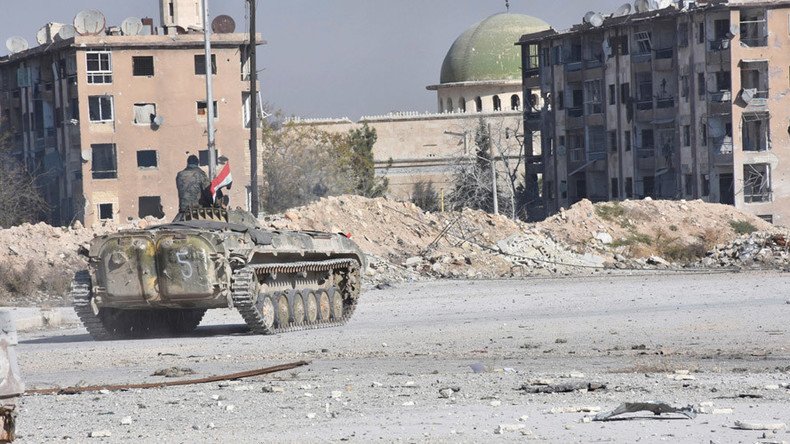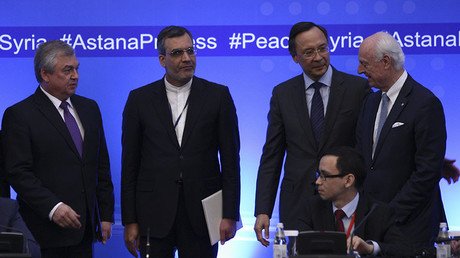‘US doesn’t control rebel groups on ground in Syria, Turkey does’

As Turkey has actual control over some of the so-called rebel groups in Syria, it could hold some of them back, Syria analyst Kamal Alam told RT, commenting on the implementation of the safe zones deal, noting that the US just gives them money and weapons.
A plan for safe zones in Syria drawn up by Russia, Turkey, and Iran came into force on Saturday. It includes establishing no-fly zones in four de-escalation areas. All of the zones consist of both government and rebel-controlled areas. In addition, Russia and the US have expressed readiness to restore military contacts over Syria.
RT asked Syria analyst Kamal Alam whether this is the beginning of closer US-Russia cooperation in Syria.
Russian & US top brass discuss plan for Syrian safe zones https://t.co/R4CycgXJYU#syriasafezonespic.twitter.com/OgMS1HzEiu
— RT (@RT_com) May 7, 2017
Kamal Alam: It could well be. The Trump administration in the run-up to the elections were saying very clearly the only way to end the war in Syria is to look for a close cooperation with the Russians and, of course, then we saw what happens after the election. But this seems to be what was originally in the cards: Trump and the generals around him, some of them were very clear that this war can only end with close cooperation with the Russians. The main reason is the Russian military has done a very successful counter-insurgency job in Syria. Something that the coalition forces have failed to do.
RT: Do you think the Pentagon will comply with the de-escalation deal?
KA: I think that is something to be determined as to whether Turkey can hold back some of the groups that it supports in Syria. The Americans, for their part, I don’t think have any control over the so-called rebel groups on the ground. They give them money and weapons, but the actual control of these groups lies in Turkey’s hands. With the de-escalation, it will be interesting to see how this pans out.
RT:With the US and Russia talking again, is peace in Syria more likely?
KA: Of course, I hope so, and it is always good to be optimistic, but every time there seems to be light at the end of the tunnel, something dramatic happens to throw peace out of the window. We saw with the alleged attacks in Idlib a month ago – just when Trump said that President Assad is not an enemy. Two days after that there was an attack by someone that wanted to spoil peace. It seems that this is a very good opportunity for peace and the Astana peace accords have been very successful, whilst the Geneva [talks] were a failure…
Middle-East expert Marwa Osman agrees that there is now a possibility for closer cooperation between Moscow and Washington on Syria.
“I do believe it might be some sort of closing if you will – politically speaking and diplomatically speaking – between both the US and Russia, if the US actually holds off the so-called rebels, or the insurgents that they back as well. We saw the memorandum being agreed upon by Iran, which has forces on the ground; by Turkey, which has forces, and also which helps and supports other forces on the ground, which are against the Syrian government; and Russia, the main ally of the Syrian government. So, these three [countries] have backed this memorandum and they have the capability to control the groups that are fighting on the ground, which report to them,” she told RT.
However, she went on to say that there are groups that are controlled by the US, and it remains to be seen whether they will observe the agreements and end hostilities in the four safe zones.
“There are certain groups that also report to the US, for example. We’ll have to see if these groups will abide by the ceasefire or the so-called safe-zones, de-escalation zones, or not. Will the US and their allies … whether in the coalition, or Israel… abide by the no-fly zone whatsoever for anyone over these four areas, and especially in the southern part of the country. The fourth de-escalation zone is in the southern Syria part, Daraa and Quneitra. Over the six past years, we have seen both the US and Israel conduct airstrikes in those areas in specific,” she said.
“Concerning what might happen to the areas where ISIS [Islamic State, formerly ISIL] is, the Syrian government said it will keep fighting terrorism where it is. I don’t think that ISIS will show up any time in Idlib or in Eastern Ghouta, for that matter. We know who the groups are that control the area, and ISIS is a bit far. But we did see starting yesterday, I think at midnight, an escalation from the Syrian government towards Deir ez-Zor and Tadmor (Palmyra). They have in mind that these areas have to be cleaned out from ISIS as fast as possible,” Osman added.
The statements, views and opinions expressed in this column are solely those of the author and do not necessarily represent those of RT.












